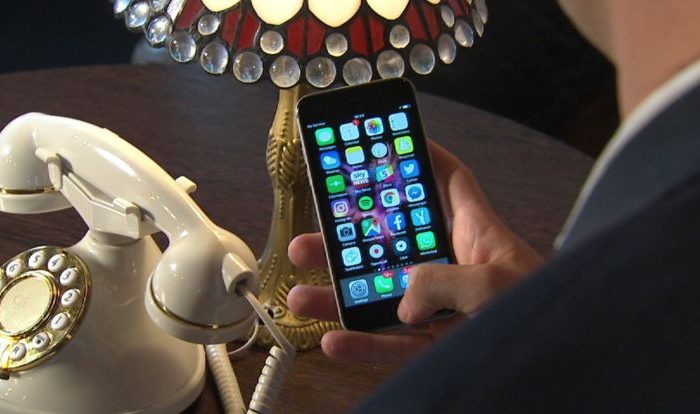



A 19th century technology is helping solve a very 21st century problem by stopping people being distracted by their phones.
By Tom Cheshire, Technology Correspondent
OF all the gin joints in all the world, one bar in Hove is taking a different approach to stop its patrons using smartphones.
The Gin Tub isn’t banning them, it is blocking their signals, using a technique first discovered in the 19th century.
The proprietor was inspired by the 19th century physicist Michael Faraday.
Steve Tyler told Sky News: “So basically we built a Faraday cage. A Faraday cage is a tin box that prevents signals from coming in.
“I just wanted people to enjoy a night out in my bar, without being interrupted by their phones.
“So rather than asking them not to use their phones, I stopped the phones working.”
Mr Tyler said the only complaint he had was from a customer whose phone did in fact work. He moved them to another table.
The system was easy to install.
He added: “It’s not difficult at all.
“It’s silver foil in the walls and it’s copper mesh. And it’s not the perfect system, it’s not military grade.
“The Americans are still listening. But the general public get poor signal or no signal, so they have to go outside to use their phones.
“That’s what I want them to do. I want them to talk to the people they’re with, not the people they’re not with.”
The law is slightly unclear on blocking phones.
The Wireless Telegraph Act 2006 states that “the use of any apparatus, whether or not wireless telegraphy apparatus, for the purpose of interfering with any wireless telegraphy, is an offence”.
That certainly includes electronic jamming devices (which the Gin Tub isn’t using), since those interfere with communications over a wide area, and could disrupt emergency services.
Faraday cages are a grey area.
An Ofcom spokesman told Sky news: “Unlike jammers, Faraday cages don’t proactively cause interference, although they do interfere with mobile reception.
“We would always recommend people seek legal advice if they are unsure whether an installation breaches wireless telegraphy laws.”
David Stupples, professor of electronic and radio systems at City University of London, told Sky News: “You could use jammers, it will actually transmit on the same frequency on the mobile phone, so it will receive noise and noise only.
“In this country, and most countries, that’s totally illegal.
“The Faraday cage is sitting on the edge of what is legal and what is not.
“I understand some restaurants use it and some don’t in certain areas. It’s debatable whether that’s illegal or not. But it is on the edge.
“He invented it in 1836. The Faraday cage is used all the time so it’s nothing new about it, it’s really, really quite basic technology.”
Faraday Cages are probably all right in the eyes of the law.
So, in Hove at least, it seems that a 19th century technology is helping solve a very 21st century problem. new.sky.com
Sorry. No data so far.

